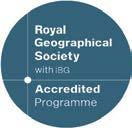
We are 19th in the world and 7th in the UK for geography.*
*QS World University Rankings by Subject 2023



We are 19th in the world and 7th in the UK for geography.*
*QS World University Rankings by Subject 2023

Welcome to our 2023/24 guide to studying geography at university level, where we delve into the myriad opportunities and advantages this dynamic field offers. In an era defined by global challenges, geography has emerged as a vital discipline, addressing pressing issues that affect both people and our planet.
From urban planning to climate change, environmental science to geopolitics, geography provides an essential lens through which to understand the world. What sets geography apart is its unparalleled potential for shaping meaningful careers, and this guide is your gateway to exploring the vast array of possibilities.
If you’re considering pursuing a geography degree, this guide is your road map. Hear first-hand from current undergraduate and postgraduate geography students as they share their educational journeys and insights.
For those planning ahead, on pages 14 and 15 we showcase inspiring stories of geography graduates thriving in diverse careers. The time has never been better to embark on a remarkable academic journey exploring the world of geography.
Grace Gourlay, editor, Study Geography
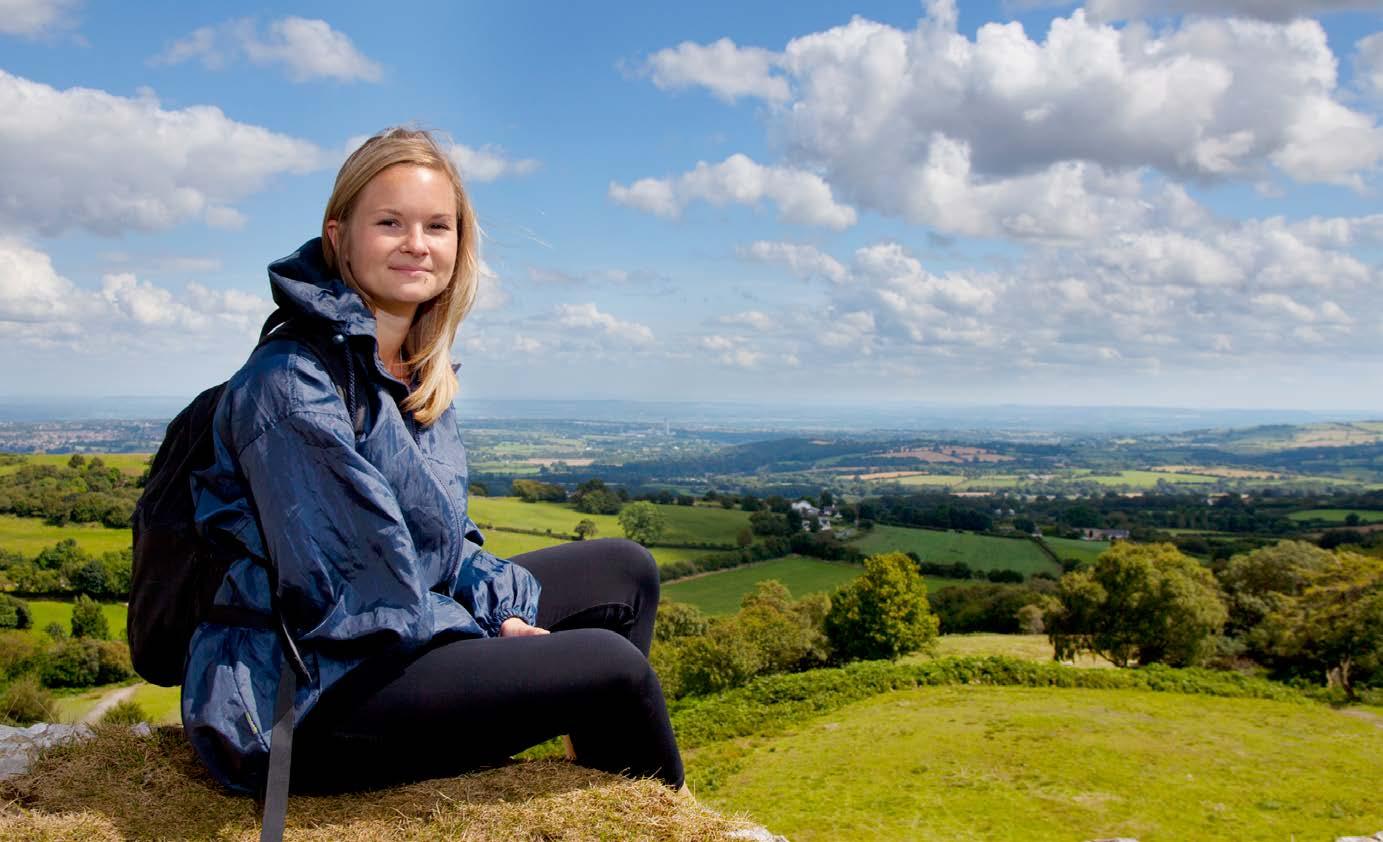

Gain the knowledge and skills to tackle global priority issues, such as the climate crisis, social inequality and hazard vulnerability, and play your part in creating sustainable futures for all.
• Geography BA (Hons)* / BSc (Hons)*
• Geography with Year in Industry BSc/BA (Hons)*
• Geography with Year Abroad BSc/BA (Hons)*
• Geography (Combined) BSc/BA (Hons)
• Natural Hazard Management and Geography BSc (Combined Hons)
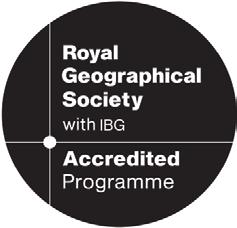
Top 20% in subject group for student satisfaction
Complete University Guide 2024
94% of graduates in employment and / or further study
Graduate Outcomes Survey 2020/21
Work placements built in to every course
International fieldwork opportunities
Free language tuition *
Career support from day one


Explore earth, its climate and its environments, with flexible, tailored geography and geology degree courses at Edge Hill University.
- Fully-funded field trips, carefully selected to reduce our carbon footprint, will feed your curiosity
- Training in industry-standard field, laboratory and computing equipment, such as drone and laser-scanning technologies
- Career-focused learning and employability activities embedded across all three years
ehu.ac.uk/geography EXPAND

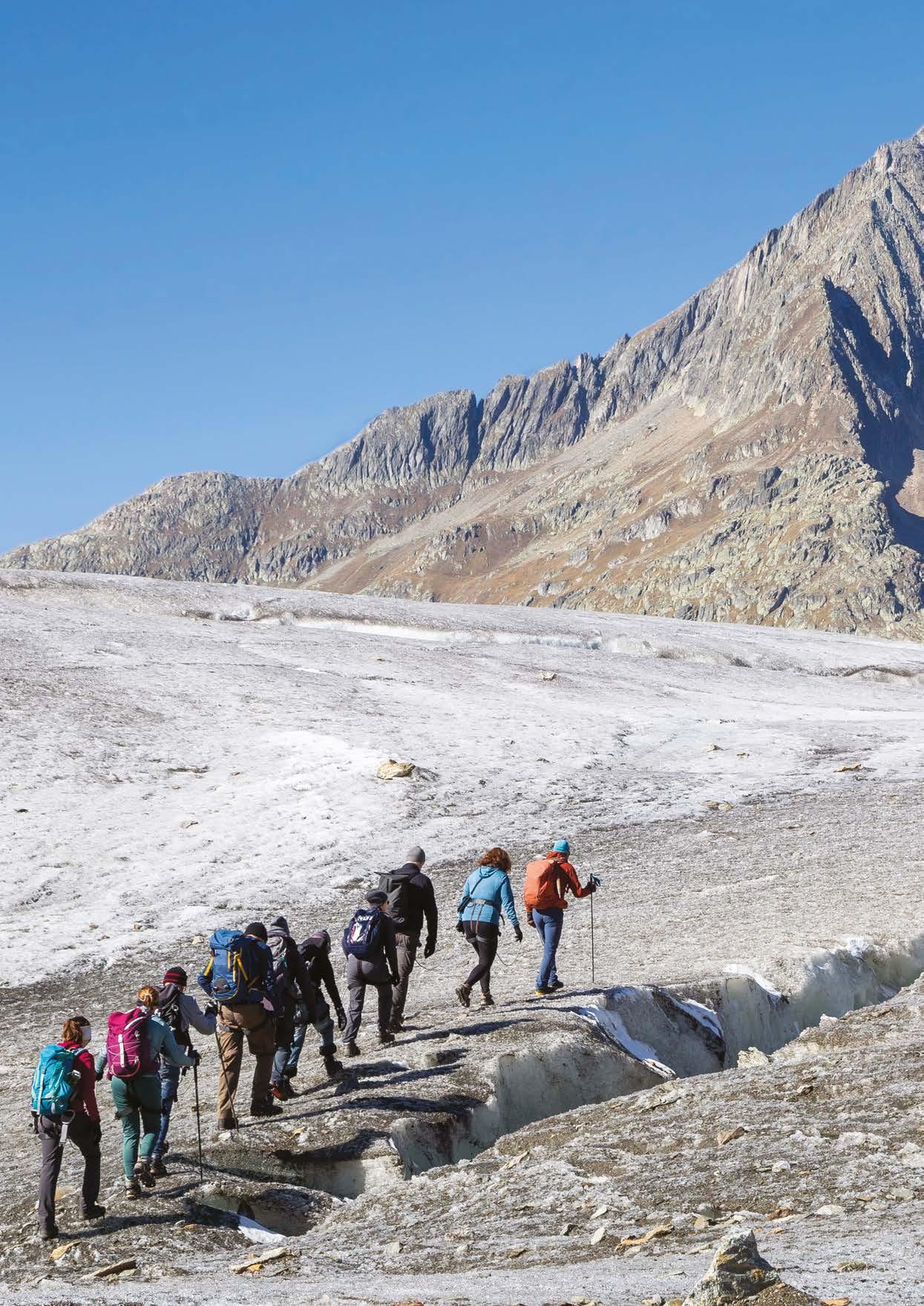
Geography is a multidimensional discipline, encompassing physical landscapes, human interactions and our intricate relationships with the environment. Its wide-ranging scope ensures that there’s something for everyone
A field trip to a glacier in Switzerland. Photo: ShutterstockGeography is one of the most relevant areas of study today, providing a perspective on the world’s most pressing issues. Thanks to the breadth of topics that geography includes, there’s a wide range of degree options, with the main subject areas being human geography, physical geography, environmental science and climate change. The many strands of geography provide an academic framework for better understanding the complexities of global issues such as climate change, geopolitical conflict and migration. A geography degree can empower you to make a difference in the world, whether by helping to mitigate climate change or enhancing development and aid efforts.
Human geography examines populations, cultures, economies and political structures, to better understand society’s relationship with its environment. Students gain a thorough grasp of social dynamics, urbanisation processes, migratory patterns and geopolitical connections and conflicts. Course units usually include cultural, political, urban and economic geography, providing students with a wide breadth of geographical subdisciplines. This deeper understanding is critical for tackling significant global concerns, including economic inequality, urban planning, resource allocation and sustainable development.
Physical geography is the study of the processes that shape the planet’s surface, the plants and animals that inhabit it and the spatial patterns they display. It covers a wide variety of subjects, including hydrology, climatic patterns, ecosystems, geology and meteorology. Physical geography students investigate the complexities of the natural processes that have shaped our world over time. This knowledge is necessary for environmental and plant and animal conservation, land management, disaster preparedness, sustainability and ecological consultancy. Physical geography teaches students critical skills that they can use to confront real-world problems, such as investigating geological hazards, mapping topography for infrastructure projects and researching biological responses to changing climates.
Environmental science is an interdisciplinary field that combines parts of physical geography and earth science to study the environment, natural ecosystems and how humans interact with and affect the environment. Environmental science looks at issues such as climate
change, pollution, deforestation, biodiversity loss and water shortages, all of which have a profound impact on the planet’s health. Environmental geographers are vital for the development of solutions to address these difficulties and to promote sustainability. Their knowledge influences policymaking at the highest level and encourages activities that protect the Earth’s fragile ecosystems.
Climate change research is an essential and intersecting subject within geography. Climate change crosses traditional discipline lines, necessitating an interdisciplinary approach. Climate change geographers investigate the varying effects that climate change has on specific areas, communities and ecosystems, as well as the underlying causes, such as greenhouse gas emissions and deforestation. This broad understanding enables students to interact with climate change’s scientific, social, economic and policy aspects. Graduates have the skills to significantly contribute to global efforts to reduce emission levels, develop renewable energy sources and devise solutions for climate adaptation.
A degree in geography, or in one of its many subdisciplines, goes far beyond academic research or theoretical understanding; it cultivates practical expertise and an intellectual curiosity about the world and its geographical processes. Geographers gain skills in critical thinking, geographical analysis and conflict resolution that are highly transferable to a variety of occupations – one of the many reasons why geography graduates are so employable.
Geography graduates have the tools to handle challenging obstacles in the real world methodically and independently, whether they’re engaged in urban planning, environmental consulting, international relations or disaster management.
Moreover, geographical education emphasises hands-on experience through fieldwork and real-world application. This enables students to gain practical abilities that may be employed immediately in real-world situations. Geographers excel at linking theory and practice, whether performing environmental evaluations, mapping vulnerable regions or analysing population patterns.
Studying geography is an experience that provides both knowledge and opportunity. Human geography, physical geography, environmental science and climate change all contribute to a comprehensive understanding of our planet’s complexities. As our world becomes more interconnected and environmentally vulnerable, the skills and understanding gained by studying geography at university level become even more crucial.
BSc Geography
Aberystwyth University
I’ve always loved how dynamic geography is, and how it is constantly shifting to reflect our current understanding of the world and the relationships within it. I’ve enjoyed the broadness of my degree, which has enabled me to explore a variety of human and physical geographic topics, including everything from feminist geographies, to glaciers and ice sheets. I’ve loved my courses’ focus on tangible skills and being able to apply these during fieldwork in Aberystwyth and the Bannau Brycheiniog [Brecon Beacons]. My favourite modules are geohazards, and global perspectives on sustainable society, both of which explore how society is adapting to changing global conditions. n
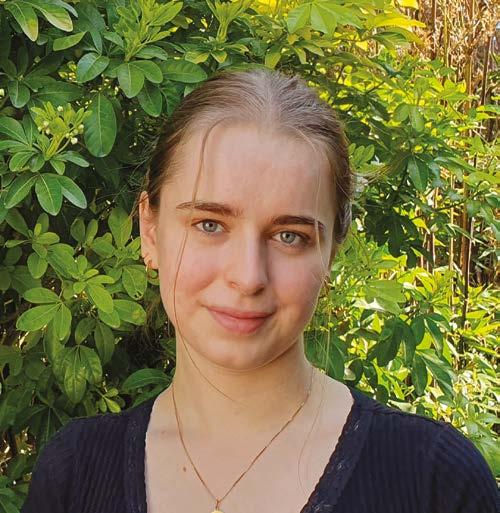 Gracie Horton
Gracie Horton
BSc Geography graduate/Master’s and PhD University of Southampton
Physical geography allows you to learn about current global issues, with opportunities to conduct fieldwork and travel. Therefore, it opens doors to further study and research or a plethora of job prospects. I chose geography because I wanted to see how our generation could help to tackle challenges including climate change and river restoration. I love the flexibility and diversity of modules that I’ve undertaken, such as GIS and Remote Sensing, a fieldwork trip to Tenerife ,and even flying drones. I was able to further my passion by representing my country at a global social entrepreneurship competition and undertaking an internship in India. I am furthering my opportunities by completing a Master’s and PhD in climate resilience. n

Lyra Napier
BA Geography with a year abroad University of Birmingham
The University of Birmingham appealed to me because it allowed the flexibility of taking modules across both physical and human geography. This enables me to approach an issue from multiple perspectives, such as environmental and feminist geographies. For instance, I enjoyed exploring the gendered impact of natural disasters on mental health. Another benefit of my course is that I get to broaden my experience by studying abroad for a year. I am currently deciding between some amazing university options in the USA, Australia and Europe.
My favourite module has been fieldwork design, which involved a trip to the Hague, an international city of peace and justice, where we had the freedom to plan and conduct our own research. n
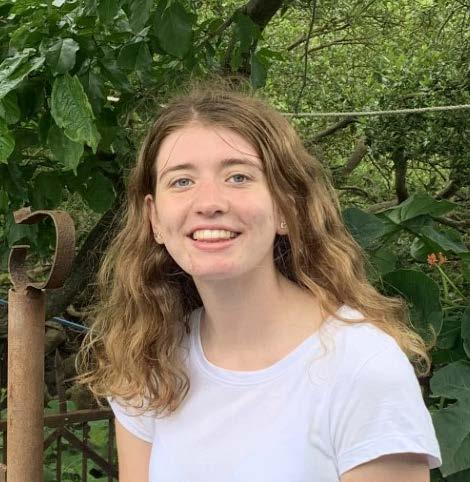


We are experts in the fields of social justice and environmental change. We explore our dynamic, diverse world to address humanity’s greatest problems. Our innovative research and practice-based learning will equip you with distinct, relevant professional skills. Study with us and change the world.
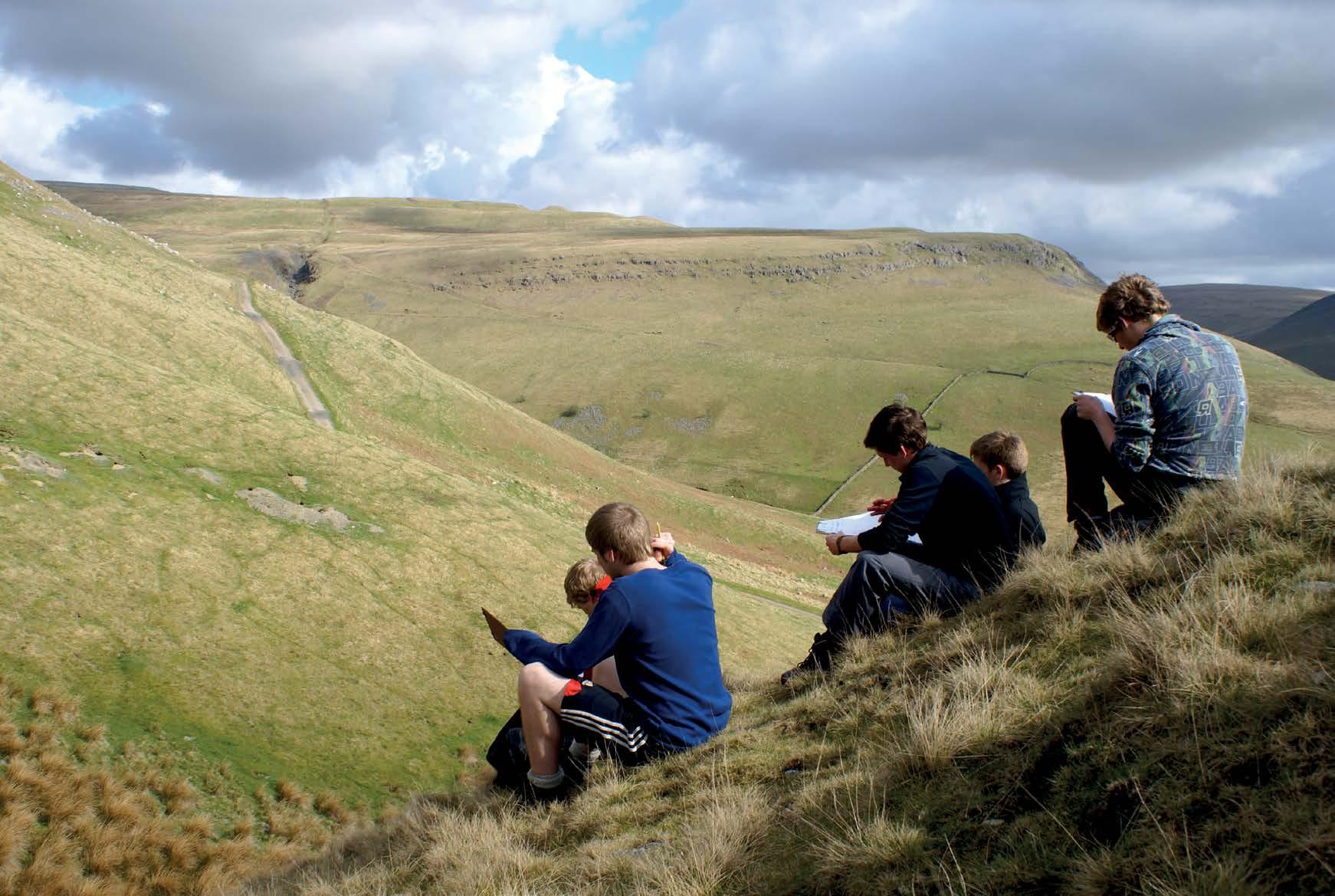
Our undergraduate degrees:
BA Geography
BSc/MGeogSci Geography
BA Global Sustainable Development
BSc/MEnvSci Environmental Science
Our masters degrees:
MSc(Res) Polar and Alpine Change
MA International Development
MSc Environmental Change and International Development
MPH International Development
www.sheffield.ac.uk/geography
geography@sheffield.ac.uk
facebook.com/sheffieldgeography
twitter.com/sheffieldgeog instagram.com/tuosgeography
Top 10 in the UK for Geography (Guardian University Guide 2023)
Top 50 in the world for Geography (QS World University Rankings by subject 2022)
One of the greenest cities in Europe, on the edge of the Peak District National Park
All core undergraduate residential field classes are fully funded by the department
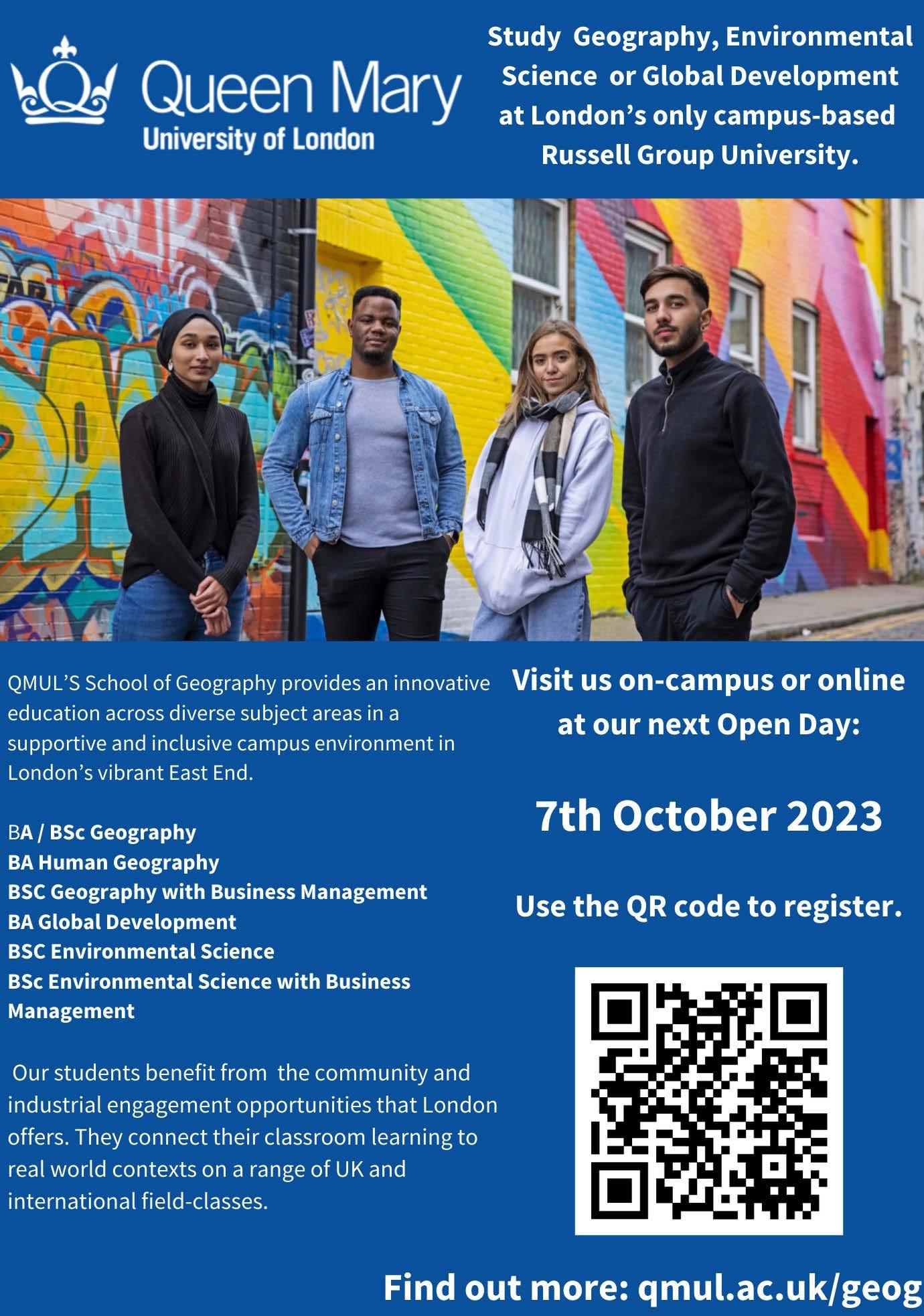

Book your place at an open day or find out more at cardiff.ac.uk
Spending a year abroad while pursuing a geography degree is a life-changing opportunity for students to broaden their horizons. Three UK students who took part in a year abroad during their geography degree describe their experiences

Chlöe Prescott
Through studying geography, I have met new people, travelled to new corners of the world and gained a unique vision of the world’s past, present and future events –from anthropogenic climate change and deforestation, to the social reproduction and economic geographies that continue to shape development today. In my second year, I had the opportunity to study abroad at the University of Nottingham’s Malaysia campus, during which I undertook a wide range of modules broadening my degree and learning from regional specialists in Southeast Asian environmental science. n
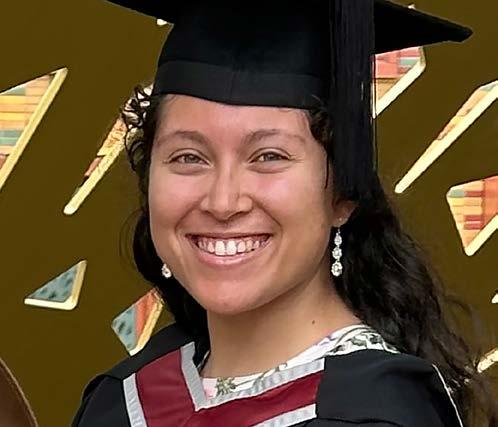

Daniel Betts
BA Geography; MSc International Business Management Newcastle University
As part of my course, I was given the once-in-a-lifetime opportunity to study abroad at the University of Illinois at Urbana-Champaign, USA. I was immersed in American university life through finding new friends and cultures, as well as being able to compare and contrast the differences and similarities of geography classes and content between the UK and US. I was able to participate in activities that aren’t found at universities in the UK, such as volunteering with the Alpha Phi Omega national service fraternity. I learned from the study-abroad experience that as geographers, we should be prepared for tomorrow’s forever-changing world. n
Megan Naggie
BSc Geography with year abroad Swansea University/ Texas A&M University
Texas A&M University was the perfect place for me to spend my year abroad! I loved my time there. The university culture and traditions are one of the kind, and they welcomed me as an honorary ‘Aggie’. The geography of the USA, as well as that of the state of Texas, was fascinating to learn about, and the extensive knowledge on GIS provided great opportunities to learn and develop my geographical skills. Lecturers were engaging, accessible and always supportive, and encouraged my learning in each class. Adapting to a new environment, as well as a new academic structure has equipped me to handle a variety of situations and tasks. n
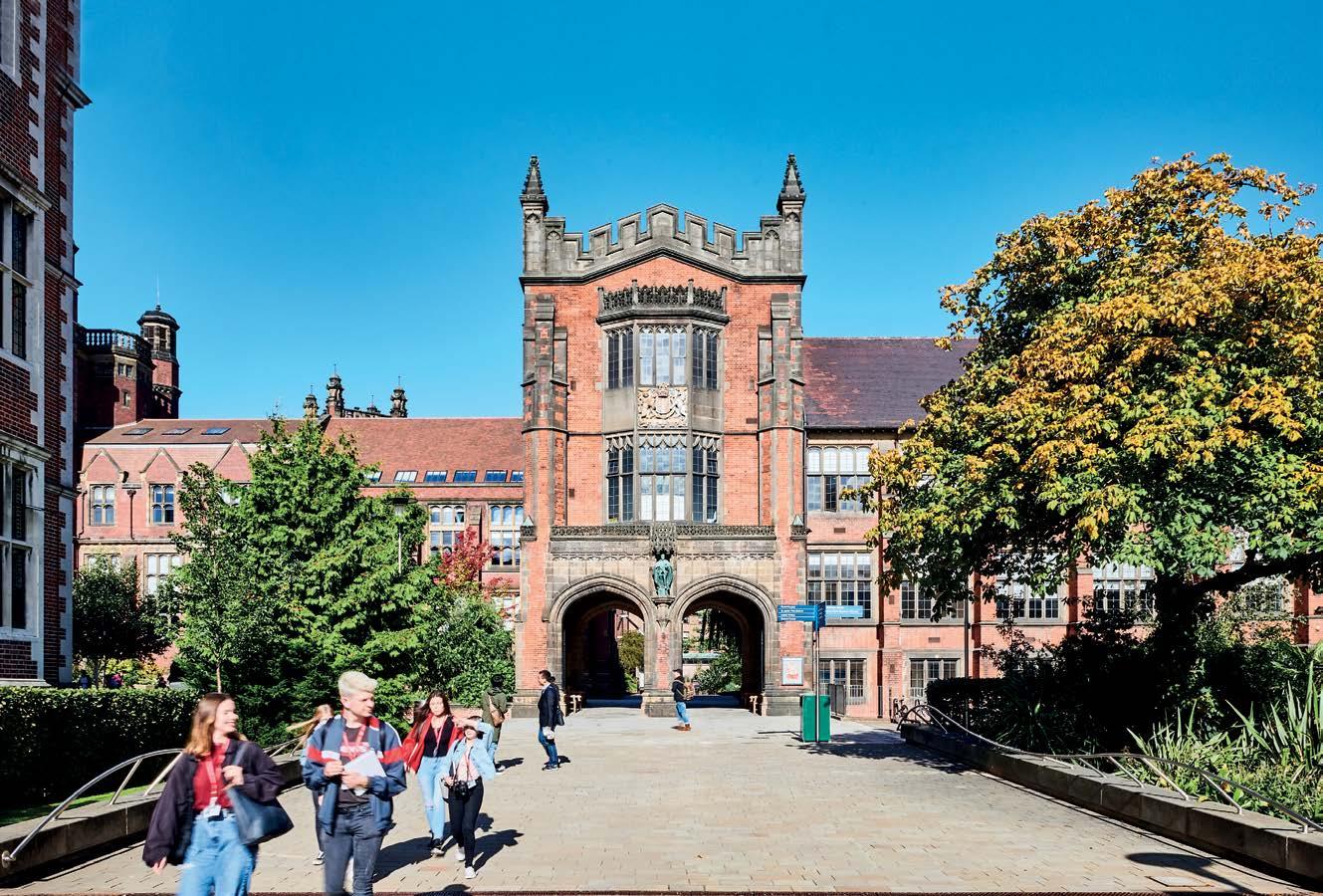
ncl.ac.uk/study-geography
Book your place at an Open Day:

When studying Geography, it’s important to learn about the world through direct experience and observation.
We provide you with opportunities to:
• Experience Geography beyond the classroom with funded field trips across the UK and abroad
• Prepare for your future career by choosing between a one-year or two six-month placements
• Choose a course that’s right for you, specialise in physical or human geography or balance the two
Discover Geography at our next Open Day, Saturday 21 October 2023.
Experience life on campus, chat to sta and students and grab lunch on us.
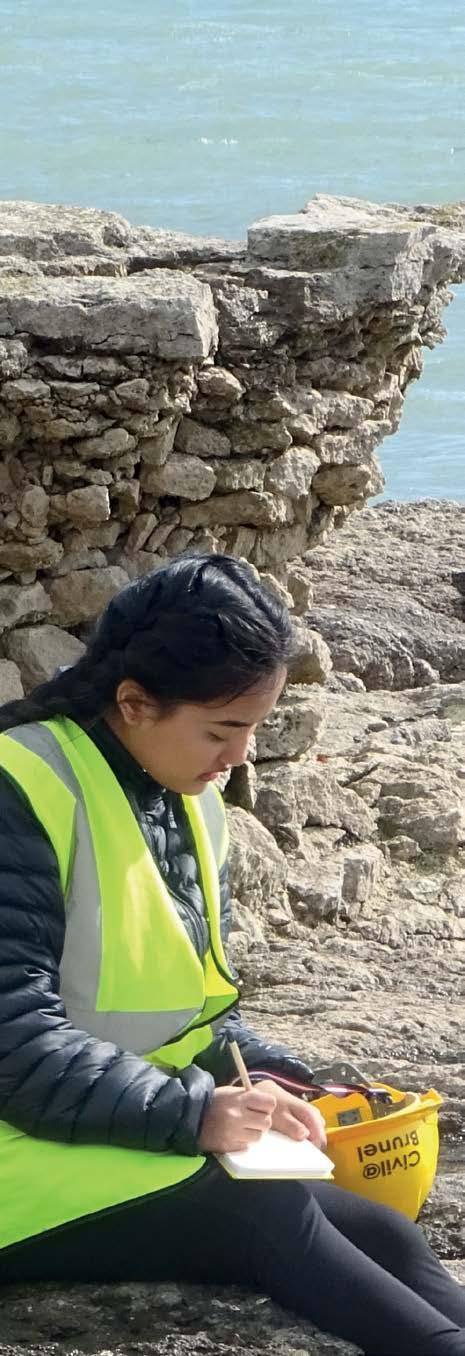





#BrilliantBrunel
brunel.ac.uk/geography
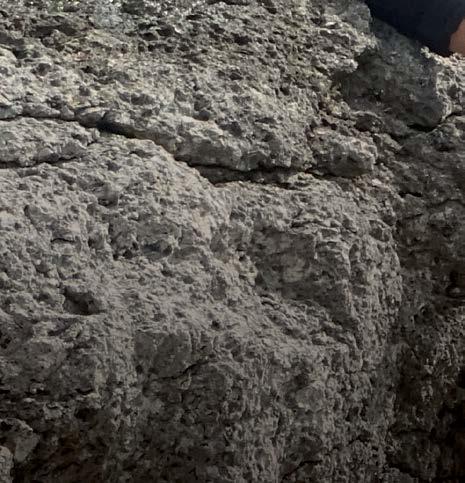
Geography graduates have one of the highest rates of graduate employment. Thanks to the breadth of subjects covered, they possess a highly diverse skillset, which helps to open doors to careers across an enormous range of sectors
Geography graduates have a wide-ranging set of abilities, which makes them desirable candidates in an abundance of employment fields. The appeal of a geography degree is its breadth, which translates into one of the highest rates of graduate employment out of any field of study. Geography prepares graduates for careers that can involve anything from physical landscapes and complex environmental processes to social interactions and urban planning. Careers in international relations, urban development, geopolitics and sustainability are just a few of the areas in which geography graduates thrive.
Geography graduates are invaluable assets in a world that is becoming more and more data-driven thanks to their capacity to analyse and comprehend complex data using a geographical context. Knowledge of Geographic Information Systems (GIS), gained from studying geography at university level, is a highly sought-after attribute, not just for use in mapping and analysis but also for assisting in decision-making processes.
Graduates in geography frequently work in areas where they’re helping to solve pressing global issues, including resource management, urbanisation and climate change. They are well positioned to make important contributions to a wide range of professions and to play a crucial part in tackling societal challenges such as these. Furthermore, their ability to bridge the divide between scientific expertise and real-world solutions equips them to lead efforts to address these issues effectively, making geography graduates crucial in creating a more sustainable and interconnected world.

Erin Mills, Remote Sensing Geoscientist
British Geological Survey
BSc Geography, University of Edinburgh; MSc Geoinformation, Technology & Cartography, University of Glasgow
My interests focused on how we interact with the physical world around us. I grew up questioning why the world is the way it is, and the reasons behind this. Edinburgh provided a unique take on geography, with space to develop and express curiosity – of which I took full advantage.
From there, I was able to integrate my passion for research and technology-based studies regarding natural hazards through further study. This consolidated my practical application of skills, built my confidence and shaped my understanding of the world of geospatial science in a workplace. I was lucky enough to receive an employment offer before graduating – and hope to make positive change to lives affected by geophysical phenomena. n

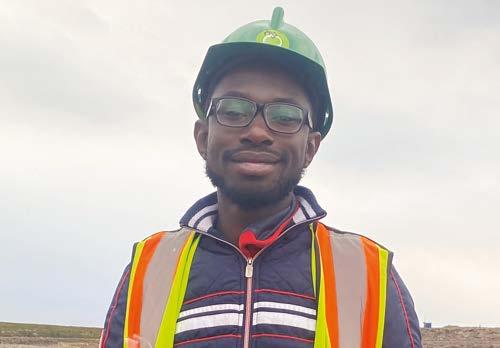
John Buluma, Tetratech
Arctic Engineering Group
BSc Geology, University of Portsmouth
My role involves geotechnical investigations for mine site projects in Canada’s northern Arctic territories. The skills I gained from my geology degree formed the foundation to work in geotechnics, the most useful being collecting and interpreting field data for maps and rock structures, in addition to report writing.
Studying geology allowed me to put these skills into practice during my placement year working on ground investigations on site, in the laboratory and compiling reports. Travel was my main motivation for taking geology, which has given me the chance to see the country from Land’s End to the Scottish Highlands – and now I work in the rugged Canadian Arctic. n
Jimmy Paul
MA Geography, Unversity of Edinburgh
As someone who grew up in the care system, who is passionate about climate action and has a strong sense of addressing the injustices we see in the world, studying geography afforded me the opportunity to explore many of the things that I’m most passionate about. In a phrase, geography is about people and place, and through my degree, I learned to critically analyse the impact of the decisions that we make on people and the environment. This has set me up for my career taking up leadership roles in the health service, care reform in the looked-after-children sector and also in violence reduction. My dissertation was great fun – looking at how people use nightclub spaces in relation to their identity. Studying at Edinburgh, the ‘birthplace of geography’, was also an incredible experience that I would recommend to anyone. n
For more student and career profiles, head to: geographical.co.uk/studygeography
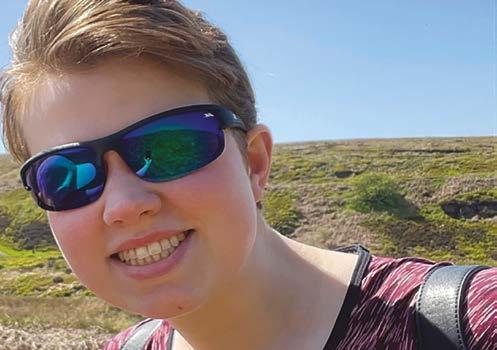
Jenny Keay, Trainee Land Consultant
Mott MacDonald
Graduate BSc Geography and MA Human Geography, Aberystwyth University
I currently work as a Trainee Land Consultant for Mott MacDonald under Advisory and Project Delivery (APD). Within this role, I undertake a number of daily tasks, including but not limited to land referencing, site organisation and visits, stakeholder engagement and notice generation. I’m part of two major projects: HS2 Phase 2a and Thames Water SRO. I have also joined the Social Outcomes Practice for APD. I studied both the Geography BSc degree and the Practising Human Geography Master’s at Aberystwyth. My job has enabled me to use the skills I developed at university and to follow my passions for geography in real work contexts. n
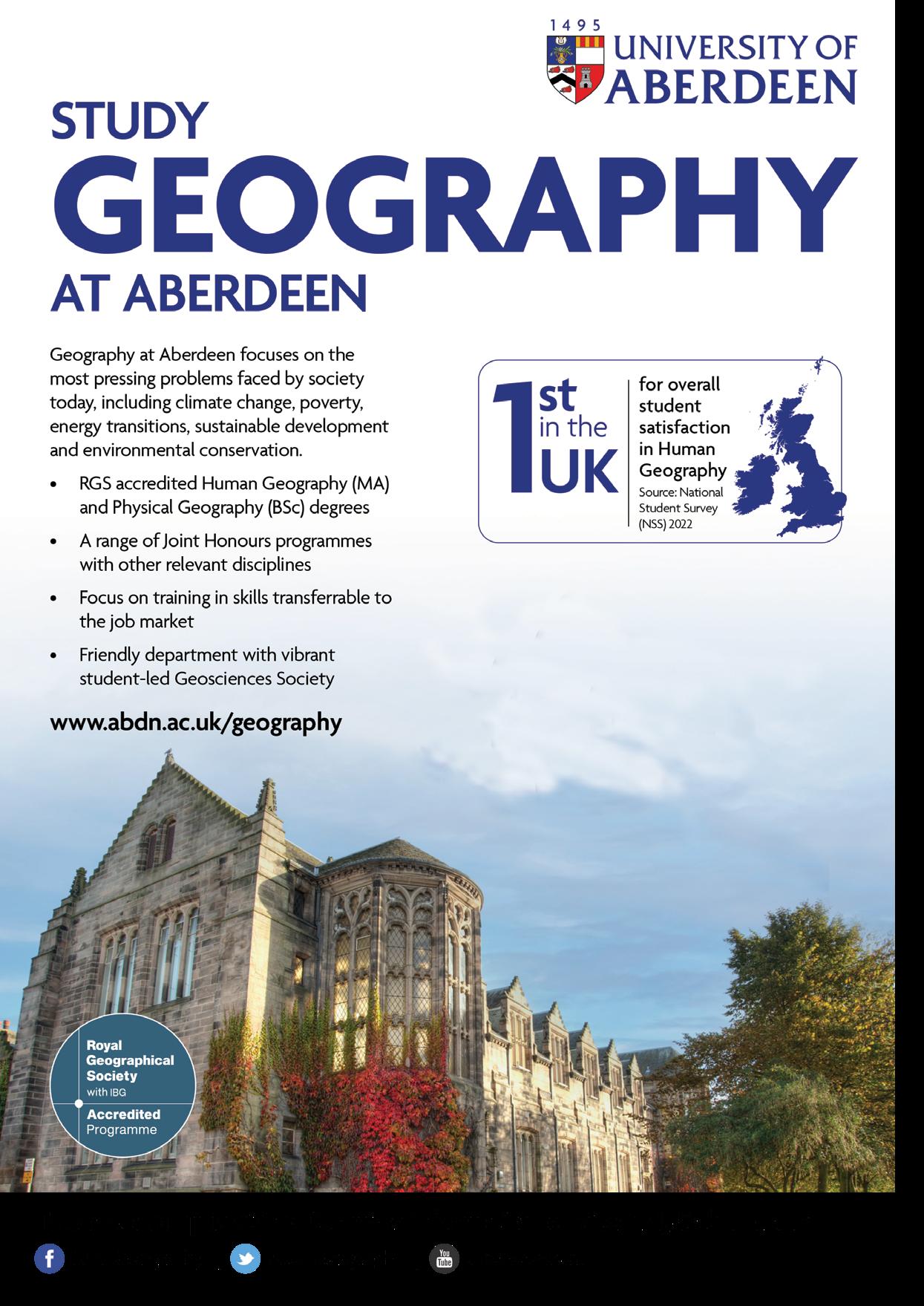
The universities offering undergraduate geography courses in the UK. Visit our website to see a full list of courses
Aberdeen – RGS Accredited
Teaching: 79.6%, Student experience: 82.3%, UCAS 179, Graduate: 81%, Grades: Standard: BBB
Aberystwyth – RGS Accredited
Teaching: 91%, Student experience: 90.8%, UCAS 122, Graduate 81%, Grades CCC-BBB
Bangor – RGS Accredited
Teaching: 85.8%, Student experience: 82.1%, UCAS 117, Graduate 69%
Bath Spa – RGS Accredited
Teaching: 64.3%, Student experience: 53.9%, UCAS 110, Graduate 62%, Grades: BBB-BCC
Birkbeck, London
Not included in surveys
Birmingham – RGS Accredited
Teaching 81%, Student experience 67.8%, UCAS 149, Graduate 85%, Grades AAB
Bournemouth – RGS Accredited
Teaching: 85.9%, Student experience: 78%, UCAS 104, Graduate N/A, Grades ABC-BCC
Brighton – RGS Accredited
Teaching: 84.9%, Student experience: 67.4%, UCAS 101, Graduate 72%, Grades BCC-BBB
Bristol – RGS Accredited
Teaching: 81%, Student experience 66.9%, UCAS 152, Graduate 84%, Grades AAB-AAA
Cambridge UCAS 186, Graduate 92%, Grades A*AA
Cardiff – RGS Accredited
Teaching: 82.6%, Student experience 71.7%, UCAS 130, Graduate 79%, Grades BBB-ABB
Chester – RGS Accredited
Teaching: 86.5%, Student experience 80.6%, UCAS
116, Graduate 67%
Coventry – RGS Accredited
Teaching 96.2%, Student experience 92.3%, UCAS 113, Graduate 75%, Grades BBC
Cumbria
Teaching 79.1%, Student experience 66%, UCAS 113, Graduate n/a, Grades BBB
Dundee – RGS Accredited
Teaching 83.3%, Student experience 82.4%, UCAS 177, Graduate 70%, Grades BBB
Durham
Teaching 89.9%, Student experience 80.3%, UCAS 172, Graduate 89%, Grades AAA
East Anglia – RGS Accredited
Teaching 85.7%, Student experience 78.2%, UCAS 124, Graduate 75%, Grades BBB
Edge Hill
Not included in surveys, Grades BBC
Edinburgh – RGS Accredited
Teaching 92.5%, Student experience 77.4%, UCAS 180, Graduate 81%, Grades ABB-AAA
Exeter
Teaching 87.8%, Student experience 78.5%, UCAS 156, Graduate 79%, Grades ABB-AAB
Glasgow – RGS Accredited
Teaching 89.9%, Student experience 80.9%, UCAS 199, Graduate 76%, Grades BCC-AAB
Gloucestershire – RGS Accredited
Teaching 98.6%, Student experience 100%, UCAS 118, Graduate 67%, Grades BBC-ABB
Greenwich
Not included in surveys, UCAS 104
Teaching quality
The rating for the quality of teaching given by final year students.
Student experience
The overall quality of the course, given by final year students.
UCAS Typical UCAS scores of entrants
Graduate prospects
Percentage of graduates who find graduate-level jobs, or are in further study at graduate or HE level, within 15 months of graduation.
Grades The standard grades required to gain entry to a department/course.
Heriott Watt
Not included in surveys
Hertfordshire
Teaching 82.9%, Student experience 78.1%, UCAS 102, Graduate 68%,
Huddersfield – RGS Accredited
Not included in surveys
Highlands and Islands
Not included in surveys
Hull – RGS Accredited
Teaching 85.7%, Student experience 77.8%, UCAS 124, Graduate 71%, Grades BBB
Keele – RGS Accredited
Teaching 88.7%, Student experience 80.5%, UCAS 113, Graduate 77%, Grades BBC
King’s College London – RGS Accredited
Teaching 86.2%, Student experience 80.1%, UCAS 147, Graduate 81%, Grades AAB
Kingston – RGS Accredited
Teaching 89%, Student experience 91.5%, UCAS 79, Graduate n/a, Grades n/a
Lancaster – RGS Accredited
Teaching 91.5%, Student experience 81.2%, UCAS 147, Graduate 77%, Grades ABB
Leeds – RGS Accredited
Teaching 81%, Student experience 73.7%, UCAS 154, Graduate 83%, Grades AAB
Leeds Beckett
Teaching 82.9%, Student experience 76.4%, UCAS 98, Graduate 62%, Grades n/a
Leicester – RGS Accredited
Teaching 87.7%, Student experience 84.5%, UCAS 120, Graduate 80%, Grades ABB
Lincoln – RGS Accredited
Teaching 86.2%, Student experience 88.5%, UCAS 118, Graduate n/a, Grades BBC
Liverpool – RGS Accredited Teaching 80.4%, Student experience 70.4%, UCAS 132, Graduate 78%, Grades ABB
Liverpool Hope – RGS Accredited Teaching 85.7%, Student experience 91.5%, UCAS 113, Graduate n/a, Grades n/a
Liverpool John Moores – RGS Accredited
Teaching 86.5%, Student experience 90.5%, UCAS 111, Graduate 66%, Grades BBC
London School of Economics
Teaching 84.9%, Student experience 75.8%, UCAS 170, Graduate 89%, Grades AAA
Loughborough – RGS Accredited
Teaching 93.7%, Student experience 93.5%, UCAS 146, Graduate 81%, Grades AAB
Manchester
Teaching 86.1%, Student experience 75.5%, UCAS 158, Graduate 80%, Grades AAB
Manchester Metropolitan – RGS Accredited Teaching 82.3%, Student experience 76.7%, UCAS 104, Graduate 72%, Grades n/a
Newcastle – RGS Accredited Teaching 80.9%, Student experience 66.8%, UCAS 137, Graduate 80%, Grades AAB
Northampton– RGS Accredited Teaching 89.7%, Student experience 86%, UCAS 102, Graduate n/a, Grades BCC
Northumbria – RGS Accredited
Teaching 89.4%, Student experience 86.6%, UCAS 124, Graduate 78%, Grades n/a
Nottingham – RGS Accredited
Teaching 86.3%, Student experience 75.3%, UCAS 138, Graduate 77%, Grades AAB
Nottingham Trent – RGS Accredited
Teaching 83.6%, Student experience 78.8%, UCAS 108, Graduate 67%, Grades BBB
Oxford
Teaching 95.1%, Student experience 89.7%, UCAS 183, Graduate 93%, Grades A*AA
Oxford Brookes – RGS Accredited
Teaching 78.7%, Student experience 72.3%, UCAS 112, Graduate 66%, Grades BCC
Plymouth – RGS Accredited
Teaching 84.6%, Student experience 80%, UCAS
117, Graduate 74%, Grades n/a
Portsmouth – RGS Accredited
Teaching 83%, Student experience 78.8%, UCAS 109, Graduate 80%, Grades ABB-BBC
Queen Mary, London
Teaching 80.3%, Student experience 71%, UCAS 125, Graduate 70%, Grades ABB
Queen’s University Belfast – RGS Accredited
Teaching 85.9%, Student experience 80.8%, UCAS 131, Graduate 70%, Grades ABB
Reading
Teaching 84%, Student experience 80.5%, UCAS 117, Graduate 69%, Grades BBB
Royal Holloway – RGS Accredited
Teaching 91.6%, Student experience 89.9%, UCAS 130, Graduate 71%, Grades ABB-BBB
Salford – RGS Accredited
Teaching 78.7%, Student experience 75.3%, UCAS 102, Graduate n/a, Grades n/a
Sheffield – RGS Accredited
Teaching 92.8%, Student experience 84.6%, UCAS 143, Graduate 83%, Grades AAB
Sheffield Hallam – RGS Accredited
Teaching 77.9%, Student experience 70%, UCAS 112, Graduate 75%, Grades n/a
South Wales – RGS Accredited
Teaching 92.8%, Student experience 89.2%, UCAS n/a, Graduate n/a, Grades CDD-BCC
Southampton – RGS Accredited
Teaching 88.6%, Student experience 86.8%, UCAS 143, Graduate 78%, Grades ABB-AAB
St Andrews – RGS Accredited
Teaching 90.1%, Student experience 89.9%, UCAS 194, Graduate 87%, Grades AAA
Stirling
Teaching 88.9%, Student experience 86.2%, UCAS 179, Graduate 72%, Grades BBB
Sussex
Teaching 85.1%, Student experience 72.5%, UCAS 130, Graduate 75%, Grades ABB-BBB
Swansea – RGS Accredited
Teaching 91%, Student experience 88.6%, UCAS 118, Graduate 72%, Grades n/a
Teesside
Not included in surveys
University College London
Teaching 83.5%, Student experience 73.7%, UCAS 169, Graduate 85%, Grades AAA
Ulster – RGS Accredited
Teaching 87.6%, Student experience 85.8%, UCAS 122, Graduate 72%, Grades BCC
UWE Bristol – RGS Accredited
Teaching 94.6%, Student experience 93.8%, UCAS 105, Graduate 69%, Grades n/a
Warwick
Teaching 90.5%, Student experience 89.4%, UCAS 164, Graduate n/a, Grades AAA
Winchester – RGS Accredited
Teaching 82.3%, Student experience 78.1%, UCAS 107, Graduate 65%, Grades BBB-BCC
Worcester – RGS Accredited
Teaching 85.5%, Student experience 85.8%, UCAS 117, Graduate 72%, Grades n/a
York
Teaching 84.4%, Student experience 73.4%, UCAS 137, Graduate 75%, Grades ABB
York St John – RGS Accredited
Teaching 88.4%, Student experience 86.8%, UCAS 109, Graduate n/a, Grades n/a
Sources: Teaching and students: National Student Survey (NSS).
UCAS: This is the average new UCAS tariff score for new students under the age of 21 taken from Higher Education Statistics Agency (HESA) data.
Graduate prospects: This is the percentage of graduates undertaking further study or in a professional job, in the annual survey by HESA six months after graduation
For more information about university life, how to apply and careers in geography, visit the Study Geography section on our website
Aberdeen The university offers four-year courses which include a Master’s degree in a wide range of geographical subjects. It also has postgraduate degrees in Sustainability Transitions, Land Economy (rural surveying) and Geographical Information Systems
Aberystwyth Behaviour Change; Environmental Change, Impact and Adaptation; Remote Sensing and GIS; Society, Space, and Place
Anglia Ruskin Sustainability
Bangor Environmental Science; Geography; Conservation; Conservation and Land Management; Environmental and Business Management; Environmental Forestry; Environmental Management; Soil and Environmental Science
Bath Spa Environmental Humanities
Birkbeck, London Geography; Environment and Sustainability; International Development; Climate Change; International Development and Social Anthropology; Geographic Data Science; Sustainable Cities
Birmingham Research in Human Geography; Environmental Health; Health, Safety and Environment Management; River Environments and their Management
Brighton Ecology and Conservation; Water and Environmental Management; Geographical Information Systems and Environmental Managment; Environmental Sciences; Environmental Politics; Environmental Assessment and Management; Ecology and Conservation; Geoscience; Geoarchaeology; GIS and Remote Sensing
Bristol Human Geography: Society and Space; Climate Change Science and Policy; Environmental Policy and Management; Geographic Data Science and Spatial Analytics; Sustainable Futures; Environmental Modelling and Data Analysis; Global Development and Environment; Environmental Humanities
Cambridge Geography; Environmental Policy
Cardiff Spatial Planning and Development; Urban and Regional Development; Sustainability Planning and Environmental Policy; International Planning and Development; Transport and Planning; Urban Design; Environment and Development; International Planning and Urban Design
Coventry Sustainability and Environmental Management
Derby GeoEnergy; Sustainability and Environmental Management
Dundee Geography and Economics; Geography and Politics; Geography and History; Geography; Geography with Spanish; Geography with French; Environmental Science and Geography; Environmental Sustainability and Geography; Geography and Planning; Geopolitics
Durham Geography Research Methods; Environmental Humanities; Environmental Hazards and Risk; Climate Risk and Society; Environmental and Natural Resource Economics; Master of Data Science (Earth and Environment)
East Anglia Environmental Sciences; Global Development; Global Social Development; Environmental Assessment and Management; Climate Change
Edinburgh Earth Observation and Geoinformation Management; Environment and Development; Environment, Culture and Society; Geographical Information Science; GeoSciences; Human Geography; Geographical Information Science
Exeter Conservation Science and Policy; Environment and Human Health; Global Sustainability Solutions; Critical Human Geographies; Global Sustainability Solutions; Marine and Coastal Sustainability; Sustainable Futures; Sustainable Development
Glasgow Earth Futures: Environments, Communities, Relationships; Environment & Sustainable Development; Environment, Culture & Communication; Environmental Futures: Sustainable Systems; Environmental Risk Management; Geoinformation Technology & Cartography; Geomatics & Management; Geospatial & Mapping Sciences; Global Migrations and Social Justice; Human Geography; Human Geography: Spaces, Politics, Ecologies; Land & Hydrographic Surveying; Land & Hydrographic Surveying with Work Placement; Management & Sustainable Tourism; Sustainable Tourism and Global Challenges; Sustainable Energy; Sustainable Water Environments; Urban Analytics; Urban Research
Glasgow Caledonian Climate Justice; Environmental Management (Waste, Energy, Water, Oil and Gas)
Gloucestershire Geography; Urban Planning and Design
Greenwich Global Environmental Change
Hertfordshire Data Science; Data Science With Placement Year; Sustainable Planning; Sustainable Planning and Transport; Water and Environmental Management; Environmental Management for Agriculture; Environmental Management
Imperial College, London Environmental Technology; Environmental Engineering; Environmental Data Science and Machine Learning; Ecosystems and Environmental Change; Soil Mechanics and Environmental Geotechnics; Green Chemistry, Energy and the Environment
Keele Human Geography and Sustainability; Environmental Sustainability and Green Technology
King’s College, London Geopolitics, Resources and Territory; Environment, Politics and Development; Sustainable Cities; Environmental Science for Sustainability; Climate Change: Environment, Science and Policy
Lancaster Environment and Development; Environmental Management; Environmental Science
Leeds Energy and Environment; Environment and Development; Transport Planning and the Environment; Sustainability and Business; Sustainable Cities; Climate Futures: Science, Society and Politics; Environmental Engineering and Project Management; Geographical Information Science; Environment and Development; Geographical Information Systems
Leicester Environmental Futures; Geographical Information Systems
Lincoln Geography; Physical Geography; Human Geography; Environment and Planetary Health
Liverpool Environment and Climate Change; Environmental Sciences; Geographic Data Science; Researching Crisis and Change in Human Geography; Environmental Assessment and Management
London School of Economics Human Geography and Urban Studies; Geographic Data Science; Environment and Development; Environmental Economics; Environmental Policy and Development
Loughborough Climate Change Politics and Policy; Climate Change Science and Management; Environmental Monitoring, Research and Management
Manchester Environmental Governance; Environmental Monitoring, Modelling and Reconstruction; Geographical Information Science; Global Development (Environment and Climate Change); Research Methods with Human Geography; Data Science (Environmental Analytics); Environmental Impact Assessment & Management; Global Urban Development and Planning; Pollution & Environmental Control; Urban Regeneration and Development
Newcastle Environmental Geoscience; Human Geography Research; Planning and Environment Research; Data Science
Northumbria Disaster Management and Sustainable Development; Environmental Monitoring, Modelling and Reconstruction; International Development
Nottingham Environmental Leadership and Management
Nottingham Trent International Development; Applied Ecology and Geospatial Techniques; International Relations and Security
Plymouth Human Geography Research; Sustainable Environmental Management; Environmental Geochemistry; Sustainable Environmental Management; Environmental Humanities; Planning; Environmental and Engineering Geology; Data Science and Environmental Intelligence
Portsmouth Geological and Environmental Hazards; Geographical Information Systems; Occupational Health, Safety and Environment; Environmental Geology and Land Contamination
Queen Mary, London Environmental Science by Research; Global Development; Geography
Queen’s University, Belfast Geopolitics; Climate Change; Environmental Engineering
Reading Environmental Management
Royal Holloway Global Health: Human Health and the Environment; Environmental Diagnosis and Management; Cultural Geography; Sustainability and Management; Geopolitics, Development, Security and Justice; Global Futures: Culture and Creativity; Global Futures: Geopolitics and Security; Global Futures: Justice, Development and Sustainability
Salford Health and Global Environment; Environmental Assessment and Management; Sustainability; Safety, Health and Environment; Sustainable Buildings
Sheffield International Development; Applied Geographical Information Systems; Environmental Change and International Development
Sheffield Hallam Geographical Information Systems
Southampton Environmental Consultancy; Environmental Monitoring and Assessment; Environmental Pollution Control; Energy and Sustainability: Energy, Environment and Buildings
St Andrews International Development Practice; Sustainable Development; Geochemistry; Strategic Earth Resources
Stirling Environmental Management; Environmental Remote Sensing and Geospatial Sciences
Sussex Climate Change, Development and Policy; Environment, Development and Policy; Energy and Climate Policy; Global Health; Geopolitics and International Affairs; Migration and Global Development; Migration Studies; Social Development; Sustainable Development; Sustainable Development (Online)
Swansea Environmental Biology: Conservation & Resource Management; Environmental Drone Remote Sensing; Environmental Dynamics and Climate Change; Geographic Information and Climate Change; Human Geography; Society, Environment and Global Change
UWE, Bristol Environmental Consultancy; Environmental Health; Environmental Management
Warwick Environmental Bioscience in a Changing Climate; Environmental Humanities; Global Sustainable Development; Global Decarbonisation and Climate Change
York Environmental Economics and Environmental Management; Environmental Science & Management; Corporate Sustainability and Environmental Management; Sustainability Studies
York St John Environment and Social Justice

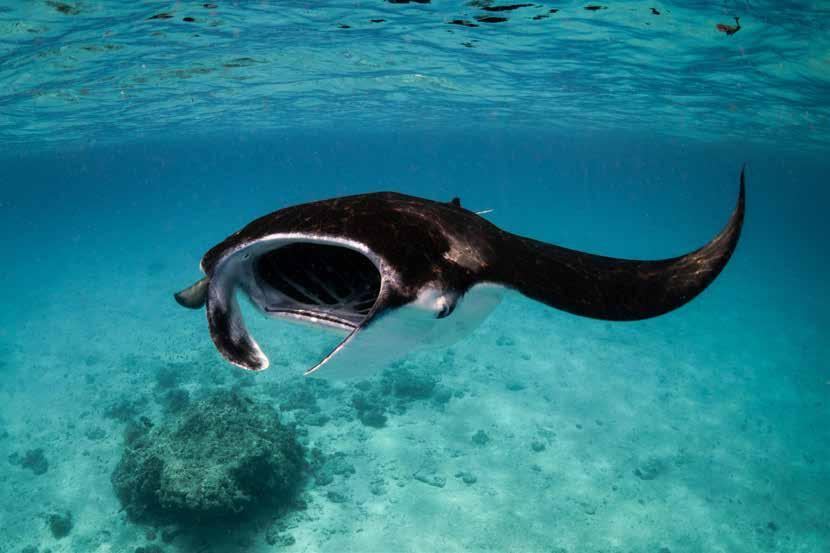



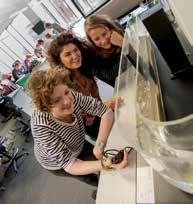


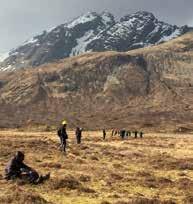
■ Geography
■ Global Environmental Change and Sustainability
■ Earth Sciences
■ Environmental Sciences
■ Urban and Regional Planning
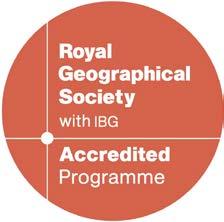
Many of our programmes are also available with an integrated Masters, Year Abroad or Professional Placement Year. Field trip opportunities available.
Be part of a vibrant community of students and staff making real-world impact by addressing past, current and future challenges in the fields of geography, environmental science and urban planning.
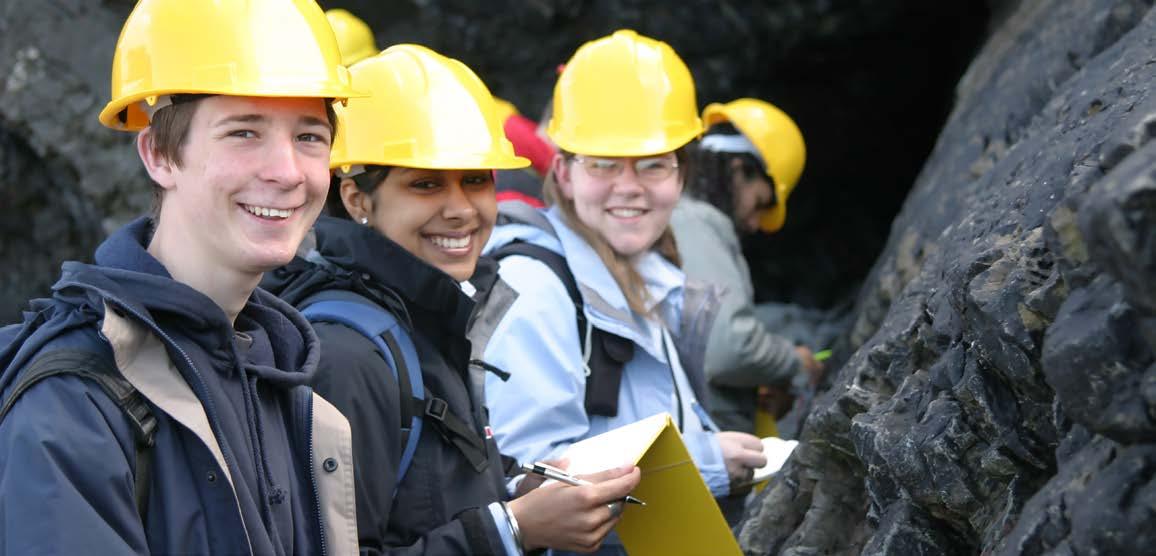
‘My favourite thing is the diversity and flexibility of the course. No other subject offers you a lecture in the morning about glaciers and a seminar in the afternoon on prison architecture! You can choose from a huge range of modules meaning that you only study what interests you.’
Find out more about our courses, entry requirements and modules: www.birmingham.ac.uk/gees/areasofstudy
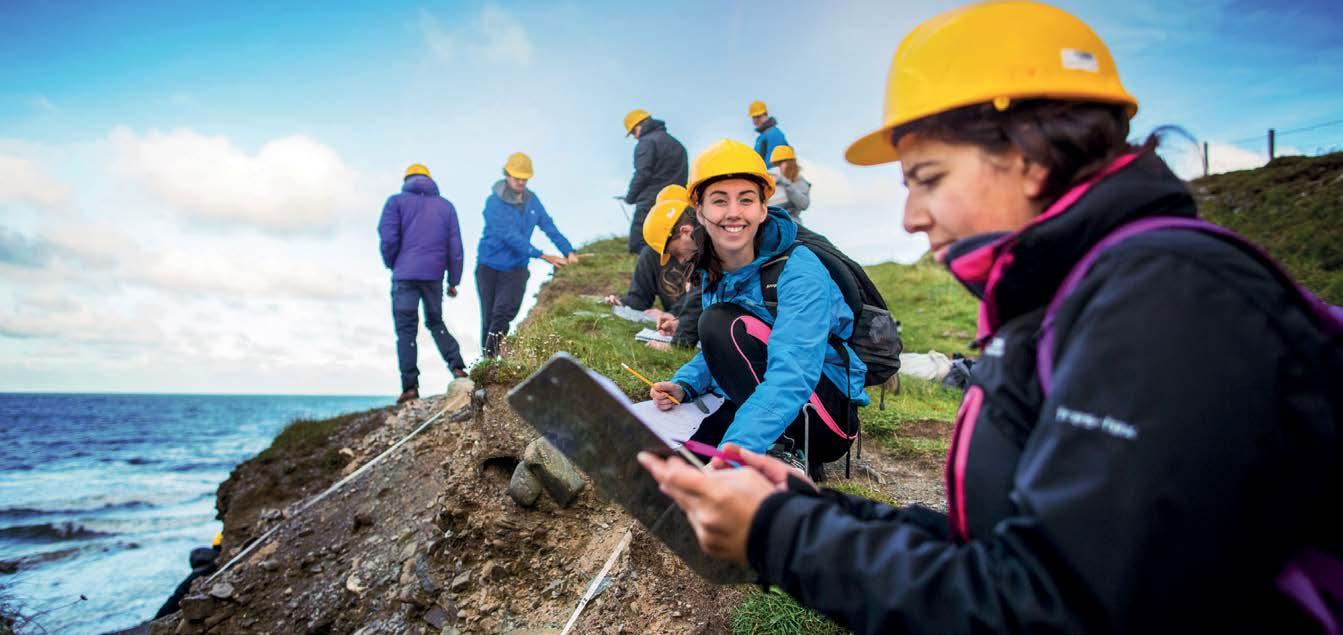
> Learn from the fantastic wealth of natural resources on our doorstep, study Geography in a stunning location between the mountains and the sea.
> We offer a range of courses accredited by the Royal Geographical Society in one of the largest and oldest Geography and Earth Sciences departments in the UK.
> We provide a range of flexible learning opportunities, with four-year study options including Foundation courses, a year in industry or study abroad.
BSc Geography (also available in Welsh)
BSc Physical Geography
BA Human Geography
BSc Environmental Earth Science
BSc Environmental Science
MSc Environmental Change, Impact and Adaptation
MSc Remote Sensing and GIS
MSc Behaviour Change
MA Society, Space and Place
Learn more about our courses and how to apply: aber.ac.uk/dges
Top in England and Wales for Student Satisfaction
(National Student Survey 2022)
Top 3 in the UK for Teaching Quality and Student Experience
(Good University Guide, The Times and Sunday Times 2023)
Top in the UK for Student Life, and Lecturers and Teaching Quality
(WhatUni? Student Choice Awards 2023)
